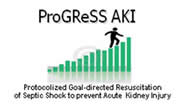|
 |
| About the study |
|
ProGReSS AKI Summary We are conducting a study called Protocolized Goal-directed Resuscitation of Septic Shock to Prevent Acute Kidney Injury (AKI), also known as the ProGReSS AKI study. This study is looking at the results of subjects who were randomized to receive a specific treatment plan in the study Protocolized Care for Early Septic Shock, known as the ProCESS study. ProGReSS AKI will focus on the long term follow up of subjects from ProCESS to see if they develop or show progression of kidney disease. This study will look at the medical intervention that subjects received during the treatment phase in the ProCESS study. Key biological signals known as biomarkers will be measured to determine if resuscitation may reduce the risk of or improve the outcome of AKI. A small number of these biomarkers will be studied to determine the ability to detect AKI and predict outcome. Few treatment options are available to doctors seeking to prevent or reduce injury to the kidney in patients with septic shock. Resuscitation with fluids and vasopressors (blood pressure medication) is perhaps the only available treatment for sepsis-induced AKI. Through this study, we have the opportunity to study the effects of resuscitation on the development and resolution of AKI in a large group of patients with septic shock and help understand what other therapies might be offered to such patients in the future. FAQs List: |
|
|
|
What is Acute Kidney Injury (AKI)? Injuries and some reactions to medications can cause the kidneys to fail very quickly. Losing a lot of blood can cause sudden kidney failure. This sudden drop in kidney function can be called “acute kidney injury” (AKI) or “acute renal failure”(AKF). AKI may lead to permanent loss of kidney function, but if the kidneys are not seriously damaged, complete recovery may occur. What is Chronic Kidney Disease (CKD)?Most kidney problems occur slowly, and a person may have “silent” kidney disease for years. The ongoing loss of kidney function is called chronic kidney disease (CKD). The kidneys filter waste and excess fluids from the blood which are then excreted in urine. When chronic kidney failure damages the kidneys, dangerous levels of fluid and waste can accumulate in the body, and loss of kidney function can occur over time leading to chronic kidney disease. AKI may lead to CKD. What is Septic Shock?Sepsis is a condition in which the body is fighting a severe infection that has spread through the bloodstream. If a patient becomes "septic," they will likely have low blood pressure leading to poor circulation and lack of blood flow to important tissues and organs. Septic shock can develop either as a result of the body's own defense system, or from toxic substances such as a bacteria, virus, or fungus. While sepsis can occur in people of any age, it is more common in infants, older adults, and people who have compromised immune systems. Sepsis is usually treated in a hospital intensive care unit (ICU). IV antibiotics and fluids may be given to try to cure the infection, and to keep blood pressure from dropping too low. What is the ProGReSS AKI Study?The Protocolized Goal-directed Resuscitation of Septic Shock to Prevent AKI (ProGReSS AKI) is a long term follow up study on subjects who were hospitalized at a participating hospital for the study called Protocolized Care for Early Septic Shock (ProCESS). While several in-hospital measurements are being collected within the ProCESS study, ProGReSS AKI intends to follow ProCESS subjects after hospital discharge to better understand the long-term consequences of sepsis. Researchers will focus on two important complications: recovery of renal function and cardiovascular consequences. ProGReSS AKI will include in hospital blood and urine collection, and four in-home study visits over the course of three years. This study will help researches determine if a subject’s treatment plan assigned in ProCESS was more effective on improving long term outcomes such as survival, renal recovery, and a reduced progression of chronic kidney disease (CKD). Who is conducting this study?This study is being conducted by the CRISMA Center located within the Department of Critical Care Medicine at the University of Pittsburgh. Who is funding this study?The ProGReSS AKI study is supported by the National Institutes of Health funded by Award Number R01DK083961 though the National Institute of Diabetes and Digestive and Kidney Diseases. When will ProGReSS AKI start and how long is this study going on?This study is scheduled to start enrolling in 2011 and the active enrollment period for the 300-400 subjects is currently 36 months. Who can be enrolled in the ProGReSS AKI?Only the subjects who were previously enrolled in the study Protocolized Care for Early Septic Shock (ProCESS) can be enrolled in ProGReSS AKI What will the study in-home visits consist of?Subjects who give their permission to participate in ProGReSS AKI will receive in-home study visits from a health professional. Once the ProGReSS AKI coordinating center receives a subject's consent, we will arrange to conduct a subject’s in-home study visit. We will be using trained paramedical professionals, who have been certified to conduct insurance physicals and the collection of blood samples. In-home study visits will consist of:
ProGReSS AKI is an observational study meaning that subjects will not be given experimental treatments. Thus the risks to subjects are extremely low and limited to the risks associated with the blood draws such as bleeding, infection, bruising and discomfort at the injection site. These risks will be minimized by having a trained paramedical professional with phlebotomy (blood drawl) experience draw blood samples. All information collected as part of study will stored in a password protected, secure database where only the study team will have access. What are the potential benefits of this study?A direct benefit of participation in this study will be free in home medical exams and lab testing. If lab testing of blood and urine samples show evidence of kidney disease, a referral will be sent to the subject’s Primary Care Physician (PCP) recommending follow up medical evaluation. |
